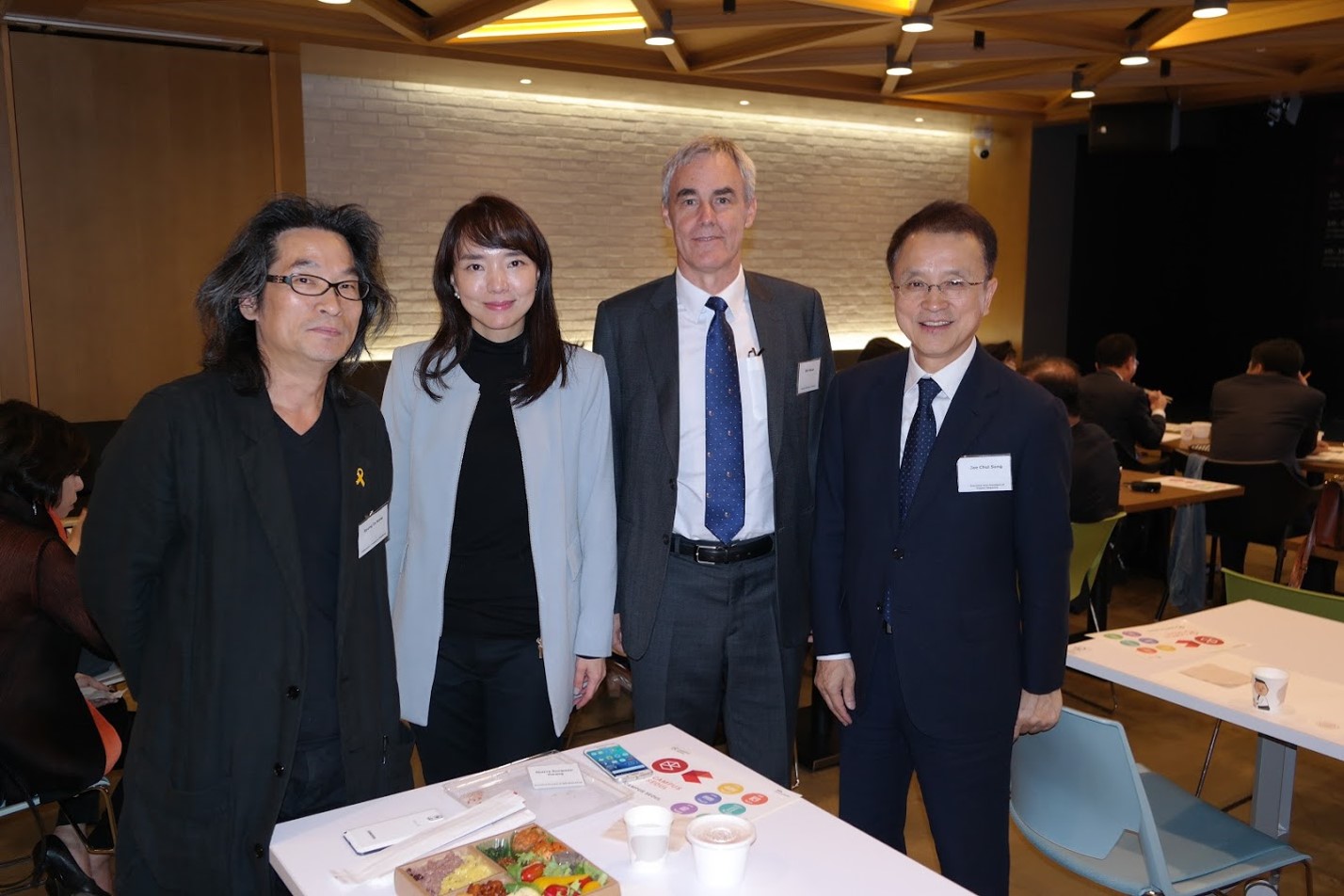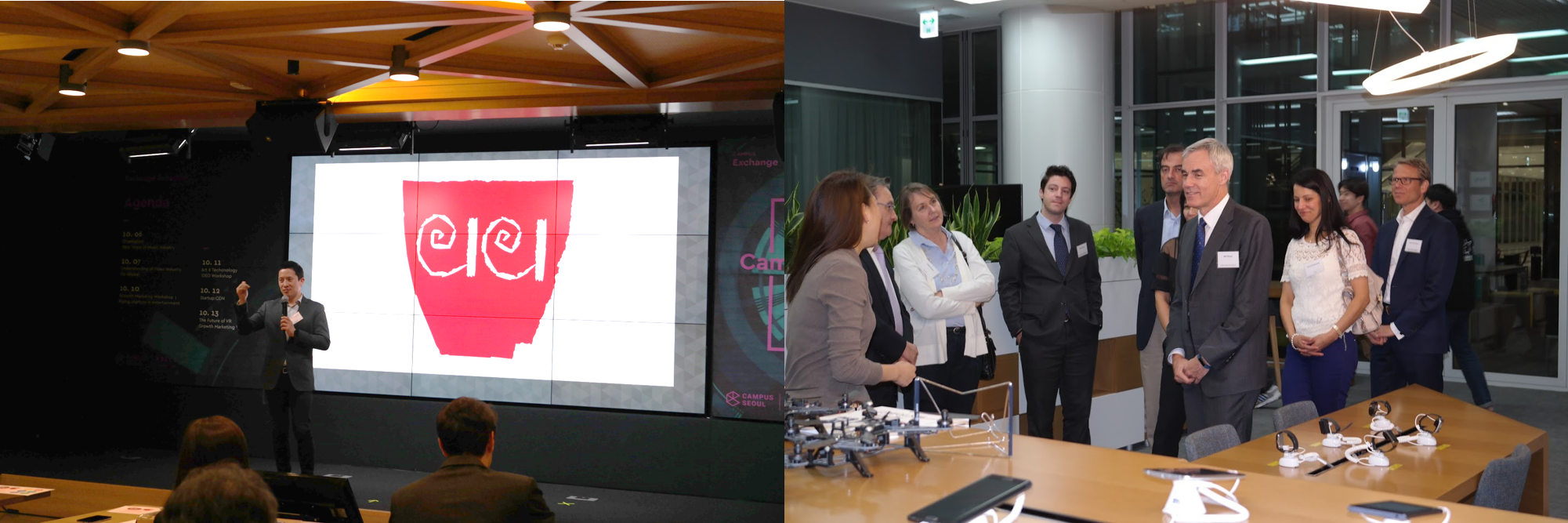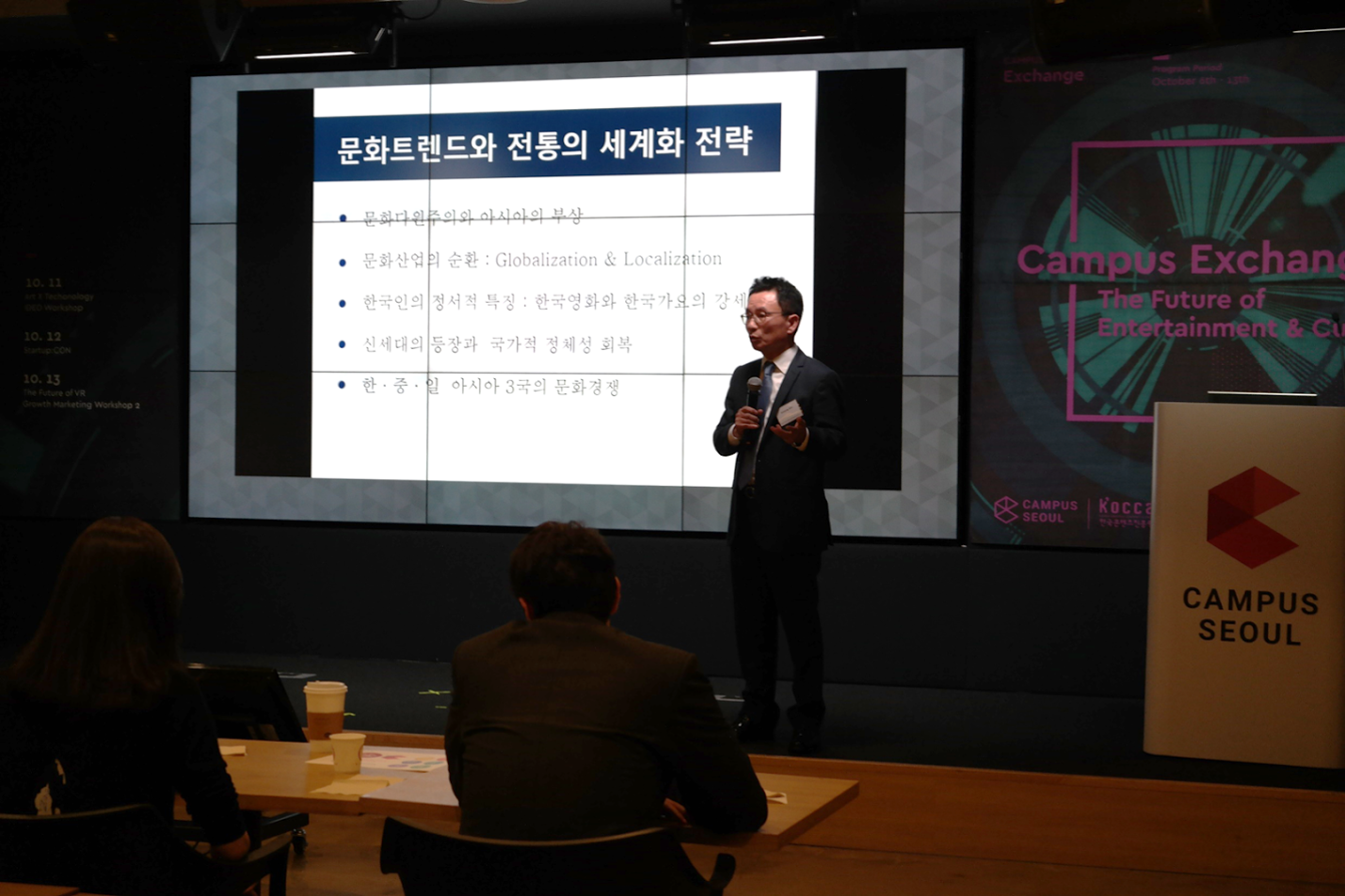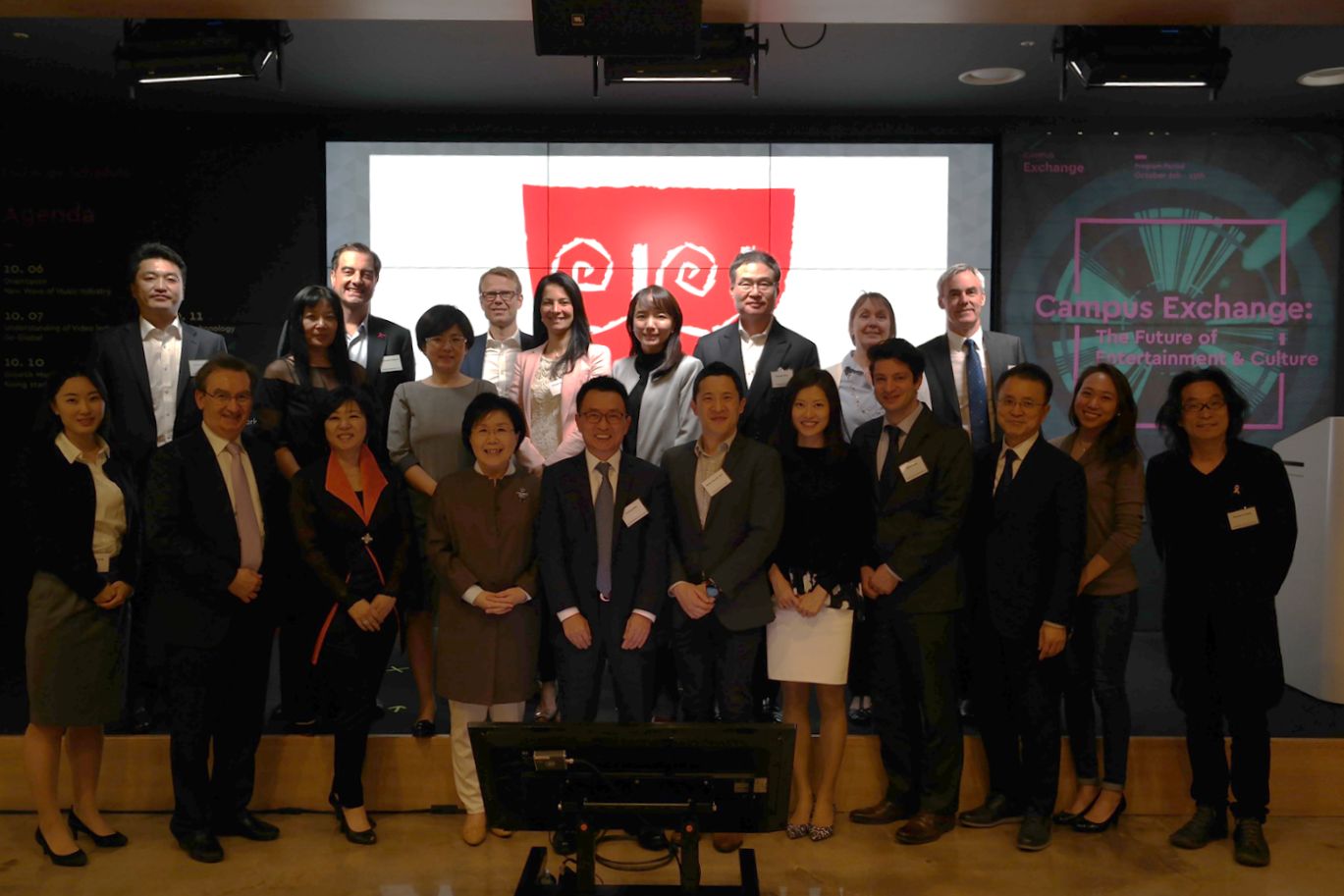
Home > CICI News > What’s New

| Title | Korea CQ – Epilogue of lecture on ‘Cultural Management – the Globalization of Tradition’ by Ahn Hosang | ||||
|---|---|---|---|---|---|
| Posted by | webmaster | Hit | 4848 | Date | 2016.10.13 |
| Files | |||||
Dear Korea CQ members,
I hope you are having a wonderful day.
On October 11, Korea CQ visited Google Campus Seoul, located at Daechidong, and had a lecture on ‘Cultural Management – the Globalization of Tradition’ by Ahn Hosang, CEO of the National Theater of Korea.
Ahn Hosang, Bill Miner, Lissa Miner, Christophe Piganiol, Susan Ling, Uloff Munster, Patricia Munster, Sung Jae Chul, Eugene Bang, Sherry Sungwon Hwang, Lee Sung Ju, Kim Kwiyeon, Didier Beltoise, Choi Jungwha, Mickey H. Kim, Susie Lee, Mark Tetto, Kim Tae Sung, Kang Byung In, Kim Soyoung, Sue Ahn, and Chung Hyojin attended this forum.
CQ members arrived at the Google Campus and enjoyed the delicious Korean dosirak food for dinner.
After dinner, Mickey H. Kim, head of Chromecast & TV Partnerships, Asia Pacific at Google, introduced Google and Google Campus to members, and gave a tour of the Campus.
Google Campus is part of Google for Entrepreneurs, where entrepreneurs can learn, connect, and create companies. There is a total of six Google Campuses around the world, and Google Campus Seoul is the only Google Campus in Asia.
Members were amazed at the various instruments, office spaces, classroom, terrace, café, and more that are provided for the entrepreneurs.
After the tour, the lecture on ‘Cultural Management – the Globalization of Tradition’ by Ahn Hosang, CEO of the National Theater of Korea and board member of the International Society for the Performing arts, started, during which members enjoyed delicious coffee specially provided by Kim Kwiyeon, president of CITIAP.
Ahn Hosang, who is well known as one of the top culture and arts managers in Korea, explained the changes and history of the National Theater of Korea, and shared his experiences on the overseas performances of original performances of the National Theater of Korea.
We thank Mickey H. Kim for inviting Korea CQ to the Google Campus, and Ahn Hosang for his interesting and informative lecture.
We also wish to thank all CQ members who attended the forum and enjoyed the evening with us, and Chung Hyojin for her outstanding interpretation help.
Notes on the lecture are attached below.
On October 18, Korea CQ will be visiting the SongAm Space Center. We are looking forward to our members’ active participation.
Thank you again for your unwavering support.
Sincerely,
Korea CQ MeeJung Kim
For more pictures, please click the link below. https://goo.gl/photos/erzQcHXUtfgc5be28
<October 11, Lecture Notes>
‘Cultural Management – the Globalization of Tradition’
Lecturer: Ahn Hosang, CEO of the National Theater of Korea (NTOK)
Overseas Expansion of the National Theater of Korea <Madame Ong> is a recreation of a story that has been passed down orally. Last April, <Madame Ong> was invited to perform as a seasonal program at Theatre de la Ville in Paris, France. This was the first time a changgeuk advanced into Europe. Theatre de la Ville may be a humble looking theater, but it is well known for having the best contents worldwide, and the pride of the audience is high. At each performance of <Madame Ong> at this theater, the theater was filled with audiences and received positive reviews. Many reviews said that there have been no such works that were such an explicit content was told so humorously, and it was the first time to see such a sophisticated musical play that was not opera, nor in French but in a foreign language. The audience also remarked that they only knew of Korea as a technologically advanced country, and they were surprised to see such a folksy, primitive, humorous traditional work.
National Theater of Korea Performances * Vortex: Premiered in 2014 as the first collaboration of the National Dance Company of Korea with a foreign choreographer since its establishment, <Vortex> was invited and successfully presented at the Cannes Dance Festival in 2015 as its opening performance. * Scent of Ink: Directed by fashion designer Jung Ku-ho and choreographed by Yun Sung-joo, <Scent of ink> was invited to the Hong Kong Arts Festival earlier this year, which is the largest performance arts festival in Asia. Since its premiere back in 2013, <Scent of Ink> was staged again for the second time this year. * Shigane Nai: <Shigane Nai> translates to <The Age of Time> It is a coproduced contemporary dance performance by the National Theater of Korea and France’s Theatre National de Chaillot in line with the Korea-France Year 2015-2016, which celebrates the 130th anniversary of diplomatic relations between the two nations. <Shigane Nai> was staged 8 times at the Theatre National de Chaillot, and the show sold out for every performance.
History of the National Theatre of Korea The National Theater of Korea (NTOK), located on Namsan, was founded in 1950 as a public theater that represents Korea. With the establishment of the National Orchestra of Korea in 1995, the NTOK managed a total of 7 resident companies, those being the National Changgeuk Company of Korea, National Dance Company of Korea, National Theater Company of Korea, National Chorus of Korea, Korean National Ballet, and Korea National Opera, and acted as a center and cradle of Korean culture. As the representative repertory producing theater of Korean performance arts, NTOK strives to improve the quality of life of the people by creating tradition-based contemporary performance arts.
Changes of the National Theater of Korea Despite the great artistic growth Korea achieved in the 80s and 90s, the NTOK failed to interact with private art groups and artists, and was disconnected with the Korean art community. With increased visits from Western arts organizations and the lengthened absence of a start artist, the NTOK grew apart with the audience as well. Also, new, modernized theaters such as the Seoul Arts Center and the LG Arts Center opened, comparing to the old facilities of the NTOK. The Korea National Opera, Korean National Ballet, and National Chorus of Korea, which are Western genres, moved to the Seoul Arts Center as resident groups, and in 2010, the National Theater Company of Korea also broke away and became an independent foundation, leaving the NTOK with only the traditional genre groups; the National Changgeuk Company of Korea, National Dance Company of Korea, and National Orchestra of Korea. Although the number of resident companies were reduced to 3, the NTOK still has a distinct identity of embracing national art communities since its foundation, and continues to create modern work based in tradition.
Introduction of Repertory Seasons in the National Theater of Korea Ahn Hosang became the CEO of NTOK in 2012. He was concerned and wondered if the NTOK could create works that the audience today could relate to with only traditional Korean genres, and fill the large theater with 1,500 seats. When thinking of the 50 odd years of the theater’s history, he was not completely positive and optimistic, but he believed that if the theater’s hardware and software were both changed, the theater could be changed into a true National theater.
In order to strengthen the NTOK’s abilities, he launched the ‘National Repertory Season’ to create a repertory for the resident companies. There were many concerns voiced by culture and art communities that this was a ‘reckless challenge.’ However, Ahn Hosang believed that this management by seasons would help national arts groups to create more differentiated contents, and that it will brand NTOK as a place where the best Korean artists create high-quality performances that audiences would always appreciate.
It is already the 4th repertory season of the NTOK. On average, every season, for 305 days, the NTOK showed 57 works, and recorded 88% seating shares, 63% of which were charged tickets. Ahn Hosang believes that the reason why the repertory season system could become stable within a relatively short period of time, is because the members of the National Changgeuk Company of Korea, National Dance Company of Korea, and National Orchestra of Korea, who are all the top in their fields, are respected as artist, and also due to the excellent production crew and staff, creating sophisticated performances.
Future Tasks The NTOK has fixed the acoustics of the KB Haneul Round Theater, and remodeled the Daloreum Theater so that the audience can enjoy the stage with less view-obstruction. The Haeoreum Grand Theater currently uses the Japanese Kabuki stage style, which does not work well with today’s Haeoreum works. Therefore, the Haeoreum Grand Theater will also be renovated to be better suited for Changgeuk and Korean dance genres. Ahn Hosang believes that the NTOK’s motivation to change and hold its place in the world as the theater that represents Korea, comes from the audience. If the audience has faith in the theater’s repertory, the number of fixed audiences and season members will increase naturally. The NTOK will strive to create a stronger trust with the audience through modern recreations of Korean traditions. Ahn Hosang believes that NTOK will once again leap forward and become the producing theater that represents Korea by steadily communicating with the audience.
<Q&A>
Q. Kim Tae Sung, Managing Director of Cheongdam Financial Center: Performance venues in Korea are poorer than other countries, but I personally think that creativity can be improved and expanded by trying to create better performances within this limited environment. What do you think?
A. Ahn Hosang, CEO of the National Theater of Korea: Stages and theaters exist for the artists and performers; they dramatize and maximize the movement of artists during performances. But as you just pointed out, the stage facilities in Korea are not well prepared. However, the greatest asset of Korean performances is the audience. The passion of the audience encourages the artists to be even more passionate on stage. I believe this is the national character of Korean people.
Q. Christophe Piganiol, President of Zuellig Pharma Korea: I believe Korean people have lost the value of tradition because they think they should appeal to the global audience, which has lead to the modernization of Korean art. Also, they feel an obsession to export Korean arts to foreign countries. I think because of these reasons, Korean people have lost their pride in Korean tradition. What do you think about this?
A. Ahn Hosang, CEO of the National Theater of Korea: Korea has a completely different history. There were no art experts and public venues to enjoy performances until Western arts were imported. In Japan, there were commercial companies which built theaters and sold tickets to the public since the seventeenth century. China already had this kind of performance businesses in fourteenth century. Korea began to see the public and commercial arts only recently as the society was industrialized. I don’t quite agree with you in that Korean people are not proud of their own traditional arts; it is just that they don’t have considerable understanding in tradition.
Q. Sung Jae Chul, Executive Vice President of Doosan Magazine: These days, young Korean people enjoy gathering and listening to live music at events like the Jazz Festival. These types of music festivals are growing, and are becoming more diverse. Is this a positive phenomenon of diversifying the forms of art? Or is this a negative phenomenon that represents the exclusion of traditional arts? What do you think of this?
A. Ahn Hosang, CEO of the National Theater of Korea: I’ve been thinking how to attract new audiences while maintaining our existing audiences. In the early days, I decisively targeted the young generation and made performances for them. Traditional Korean music is very flexible to collaborate with all genres of arts. I think in the near future, Korean traditional music groups will be chosen as main musicians at music festivals such as jazz festivals and rock festivals, which are increasing in number. If so, the audiences would be naturally attracted.
Q. Bang Eugene, Country Head Director of DBS Bank Korea: For example, Daegeum is a musical instrument from the 7th century Silla Kingdom. In this sense, traditional Korean musical instruments have longer histories than foreign musical instruments. So why are they not improved or modernized?
A. Ahn Hosang, CEO of the National Theater of Korea: I am not sure, but I think this is related with Korean’s national character.
|
|||||


















